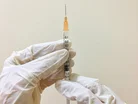CDC & Gavi: Cultivating African Vaccine Manufacturing

This is part two of our exploration of the challenges surrounding African vaccine manufacturing.
If you missed part one, which discusses the factors that have created a lack of independent vaccine manufacturing across Africa, you can read it here.
Now onto part two, which documents the key organisations looking to boost vaccine manufacturing across the continent
Africa CDC and Gavi: boosting vaccine manufacturing
The African Union (AU) has set an ambitious target for 2040. They want 60% of the total Vaccine doses required on the continent to be produced by the African vaccine manufacturing industry.
To make this target a reality, CDC has worked with African Union Member States to prioritise actions that will help local vaccine manufacturers meet the 2040 target.
This includes building on the Partnerships for African Vaccine Manufacturing established under the Africa CDC in 2021 by African governments.
The goal of the PAVM is to fuel vaccine manufacturing development, supporting projects and strengthening healthcare infrastructure.
CDC has worked with PAVM to create a Framework for Action (FFA) that will share critical diagnostic findings on Africa’s existing vaccine manufacturing environment.
The program will share eight bold programs to scale vaccine manufacturing over the next two decades.
CDC has also collaborated with Gavi, one of the world’s largest buyers of vaccines since 2001.
Gavi has a long-standing history of working closely with African countries, boosting the number of manufacturers of their vaccines from five to nineteen.
Intent on reaching the AU target for 2040, Gavi developed a ten-point plan for developing vaccine manufacturing across the continent, laying out key actions to diversify and secure vaccine supply.
As part of this plan, Gavi has introduced an innovative financing mechanism aimed at creating a sustainable vaccine manufacturing industry in Africa.
This financial instrument is designed to boost local manufacturing, enhance African healthcare infrastructure and signal Africa’s arrival to the global vaccine market.
This mechanism is the African Vaccine Manufacturing Accelerator (AMVA). According to Gavi, it will make up to US$1bn available to support vaccine manufacturing in Africa.
Through encouraging meaningful economic incentives and a path to scale vaccine manufacturing, the AMVA is envisioned as the catalyst to long-term growth for the industry.
What is the African Vaccine Manufacturing Accelerator?
AMVA is a four-step process that invests in local manufacturing and boosts economic growth across Africa.
It involves a hefty sum- of US$1bn- being split between local manufacturers in a scheme that rewards them if their products pass the World Health Organisation's strict quality standards.
Manufacturers that sell to Gavi or other major vaccine purchases will receive extra bonuses.
Gavi intends to use AMVA to speed up the production of vaccines to defend against 11 diseases, aiming to help at least four African vaccine manufacturers produce 800 million doses within the next decade.
- A vaccine manufacturer begins the application process to supply a Gavi-supported vaccine
- The manufacturer obtains regulatory approval from WHO for their vaccine
- The manufacturer enters the marketplace, and supplies Gavi-supported vaccines through UNICEF procurement processes
- The manufacturer, if successful at these steps, is eligible for an ‘accelerator’ payment as the vaccines are delivered
AVMA works by offering two types of incentive payments to offset the initial high costs of production.
Some of these payments are increased for the priority vaccine market group, a subset of vaccines needed to boost market health and meet unmet demand.
These two payment types are milestone payments and accelerator payments as indicated above.
Milestone payments
Milestone payments work to provide powerful incentives for manufacturing modes that support pandemic preparedness.
The highest payments in this category of US$25m will go to manufacturers whose vaccines prequalify after being produced with a ‘pandemic ready’ technology platform.
This includes platforms that can produce viral vector or mRNA vaccines.
Meanwhile, the lower milestone payments of US$10m will go to manufacturers that prequalify for ‘fill and finish’ manufacturing, creating vaccines in the priority market category.
All the final stages of production to receive one of these payments must occur at an African manufacturing facility.
Accelerator payments
Accelerator payments are paid to manufacturers as a per-dose ‘top-up’ in addition to the offered market rate they receive for winning Gavi-UNICEF tenders.
Accelerator payments will be at around US$0.50 per dose for vaccines produced using ‘pandemic ready’ technology platforms and for the complete manufacturing of priority market vaccines.
Accelerator payments also exist for lower-cost ‘fill and finish’ manufacturing, aiming overall to encourage sustainable, end-to-end business models for African vaccine manufacturers.
- Cholera vaccine
- Malaria vaccine
- Measles-rubella vaccine
- Hexavalent vaccine against diphtheria, tetanus, whole-cell pertussis [DTwP], hepatitis B, Haemophilus influenzae type b and polio
- Yellow fever vaccine
- Single-dose rotavirus vaccine in blow-fill-seal (BFS) presentation
- Ebola vaccine effective against two species of Ebolavirus, with improved thermostability at maximum -20°C
- Pneumococcal vaccine (minimum 13-valent)
AVMA is designed to provide incentives for ten years, with caps so no vaccine type or singular manufacturer is overrepresented.
CDC and Gavi continue to work to cultivate a broad and resilient vaccine manufacturing sector, helping to boost independent growth in this area across Africa.
******
Make sure you check out the latest edition of Manufacturing Digital and also sign up to our global conference series - Procurement & Supply Chain 2024 & Sustainability LIVE 2024
******
Manufacturing Digital is a BizClik brand.
- Thermo Fisher & Novo Nordisk Drive Future of Cell TherapyProduction & Operations
- Panasonic: Biodiversity, Manufacturing & GREEN IMPACT Pt 2Sustainability & ESG
- Why Does Africa Import Over 99% Of Its Vaccines?Production & Operations
- Saudi Aramco SATORP & Chemanol Secure 20-Year DealProduction & Operations


